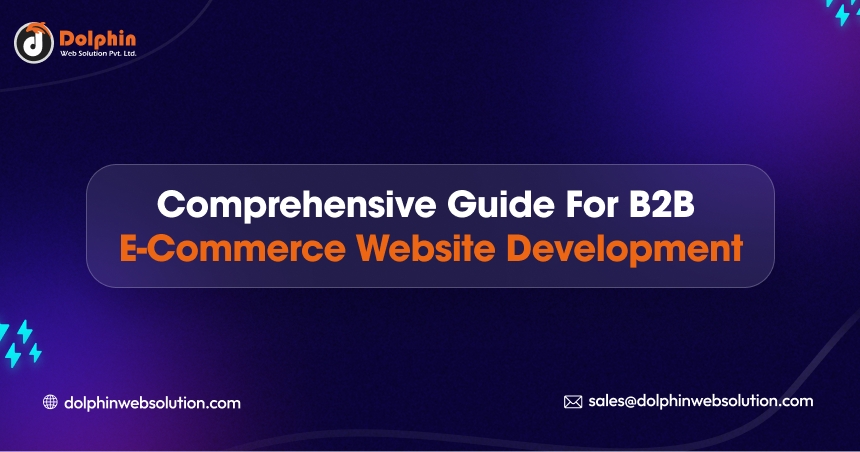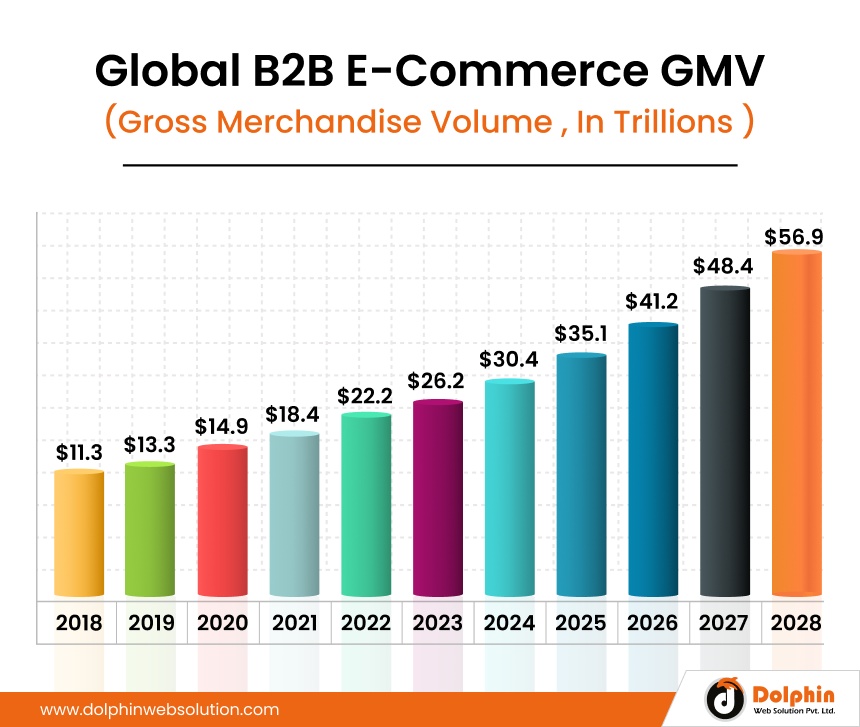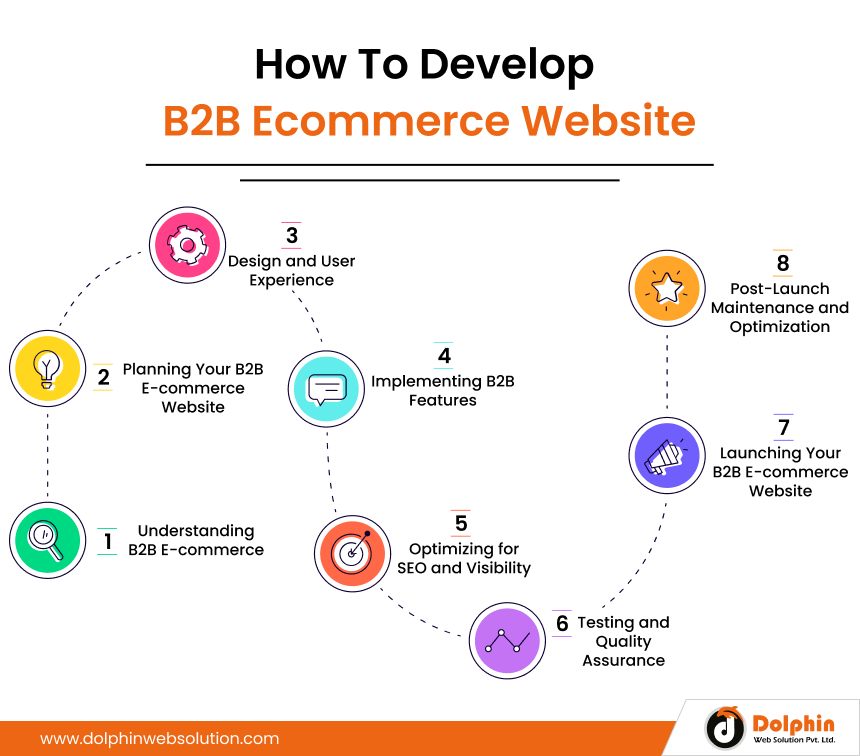Guide for B2B eCommerce Website Development

Table of Contents
- 1 How to Develop B2B Ecommerce Website
- 2 1. Understanding B2B E-commerce
- 3 2. Planning Your B2B E-commerce Website
- 4 3. Design and User Experience
- 5 4. Backend Development
- 6 5. Implementing B2B Features
- 7 6. Optimizing for SEO and Visibility
- 8 7. Testing and Quality Assurance
- 9 8. Launching Your B2B E-commerce Website
- 10 9. Post-Launch Maintenance and Optimization
- 11 Case Studies OF B2B Websites
- 12 Key Features to Include in Your B2B Ecommerce Website
- 13 Cost Ranges To Develop A B2b Ecommerce Website
- 14 Conclusion
Summary :
B2B consumers expect an unparalleled experience and extensive product catalog from their vendors. You need to provide quick, effortless buying, self-driven convenience, and seamless shopping experience to your B2B consumers. Your website should be intuitive, easily navigable, secure, and scalable. Let's see what more your B2B eCommerce website would require!
The global B2B eCommerce market was valued at US$17.9 trillion in 2021, over five times the value of the B2C market. The B2B eCommerce model has become incredibly popular in recent years, creating opportunities for businesses to grow and scale. The global B2B e-commerce market is expected to reach $18,771.4 billion by 2027. If you are willing to benefit from this industry, the first step will be understanding B2B e-commerce website development.

The B2B eCommerce model stands for business-to-business eCommerce. This platform enables companies to trade their products or services with online businesses. B2B eCommerce websites must have inventory tracking, catalog management, payment processing, and order management features. Enterprises use these platforms to sell their products, manage purchase orders, set up multiple vendor accounts, process payments, and track shipments.
When it comes to eCommerce, a well-developed website is essential. Whether you want to reach a wider audience, build customer relationships, improve revenue, or streamline your sales processes, a well-developed website is at the base of everything.
How to Develop B2B Ecommerce Website

1. Understanding B2B E-commerce
B2B eCommerce aims to streamline business and procurement processes, improve efficiency, reduce costs, and manage inventory better.
Here are the eight principal elements of a B2B eCommerce website:
- Catalog Management System
- Product Recommendation
- Account Management System
- Order Management
- Order Fulfillment System
- Inventory Management System
- Payment Gateway
- Security System
Key Differences from B2C E-commerce
B2B eCommerce platforms deal with personalized pricing, complex negotiations, bespoke customer service, and enhanced website security. Also, the purchasing decisions on these platforms are influenced by several stakeholders. On the other hand, the B2C eCommerce model relates to trading products and services with customers. B2C eCommerce focuses more on transaction efficiency and purchasing convenience. The prices of products and services in the B2C eCommerce model are usually fixed, and the customers’ individual preferences play a vital role in shaping the purchasing decisions.
Target Audience Analysis
Defining your B2B customers is way more complicated than B2C, as more individuals make purchasing decisions. It would help if you analyzed your target audience and their personalities to match their buying behavior to the touchpoints of your company development. This will help you shape the website functionality per your corporate clients’ needs. Everything should be according to your target audience, from professionalism to user interface and vitality.
Unique Challenges in B2B Transactions
Owning a B2B eCommerce website is more challenging than owning a B2C one, and here’s why:
- B2B eCommerce businesses have a more complex buying process because of extensive product ranges, lengthy purchasing procedures, bulk orders, etc.
- Establishing and maintaining customer relationships is essential as B2B customers are more inclined to sellers with whom they have a great bond.
- B2B businesses have to consider customer-specific pricing. Also, the purchasing decisions are influenced by multiple individuals and factors.
- Improved data and cybersecurity are required as companies would like to trade only with B2B vendors who would protect their sensitive information.
2. Planning Your B2B E-commerce Website
1. Defining Business Goals and Objectives
Before hiring a company for eCommerce website development, you must define your business goals and objectives. Why do I want to set up a B2B eCommerce website? What are my B2B business advantages? How do I wish to differentiate from my competitors? Where do I want to take my business in the future? Do I want to increase my revenue or rapidly scale my business?
Once you know your business goals, define your B2B eCommerce strategies and set your KPIs.
2. Market Research and Competitive Analysis
Market research and competitive analysis are essential to choose your niche. Use market research tools to understand how to penetrate the market. Research the trending products, strategies, customer preferences, etc, to gain a competitive edge.
3. Choosing the Right E-commerce Platform
The most promising way to scale and grow your B2B eCommerce business is to choose the best e-commerce framework that will align with your objectives and niche.
When choosing the best CMS platform for eCommerce, you must consider multiple factors, including flexibility and scalability. You can opt for open-source media, cloud-based platforms, proprietary platforms, etc. Your eCommerce development will help you choose the right platform for your business.
3. Design and User Experience
1. Intuitive Navigation and Information Architecture
Navigation plays a vital role in the success of any eCommerce business. It acts as a map and guides your users to where they can find their required products. Combining intuitive navigation and information architecture can retain customers longer on your website and reduce the bounce rate. If users cannot discover the correct information or products on your website, they will leave it without purchasing anything. This will lead to missed sales opportunities and a negative brand image.
2. Mobile Responsiveness
A mobile-responsive website is essential for any eCommerce brand. Your website should function smoothly on all devices and offer easy navigation to users.
3. Incorporating B2B-specific Features
Features such as discounts on bulk orders, quote requests, etc, should be prioritized. Also, ensure an easy checkout process for your customers.
4. Backend Development
1. Security Measures for B2B Transactions
A robust data privacy policy and SSL certification are essential for B2B eCommerce sites to provide the encryption and authentication required to protect sensitive customer data. Your website developer should solve any compliance and security issues for you.
Talk to your developer in-depth about your site’s backend development service.
2. Inventory Management System
As a B2B eCommerce business, you should have a robust inventory management system to check the inventory left with you. This will ensure you have sufficient stock to fulfill orders.
3. Integration with ERP and CRM Systems
Integration with ERP and CRM systems will help you understand your B2B customers better and which products they need. Choose the ideal ERP and CRM systems for your business to improve website performance and conversions.
5. Implementing B2B Features
1. Custom Pricing and Negotiation
As a B2B business, you must set and adjust prices for your products or services when selling them to other companies. The pricing will depend on market conditions, cost analysis, willingness to pay, customer value, competition, etc.
2. Account Management and Role-Based Access
The Account Management system is aimed at helping your B2B customers manage their accounts. Your website must do everything from creating user profiles to accessing order histories and setting up payment details.
3. Integration with Payment Gateways and Purchase Order Systems
B2B businesses often experience high-order value purchases, making it essential to have a robust payment gateway. Also, you should integrate purchase order systems to track and manage users’ assets better.
6. Optimizing for SEO and Visibility
1. Keyword Research for B2B Niches
Your blog and website content must contain keywords related to your B2B niche. You must conduct efficient keyword research to identify target phrases to drive more B2B customers to your website. You can use tools like Keyword Tool, Keyword Planner, SEMrush, etc, to get high-traffic B2B keywords.
2. Content Strategy for B2B Audiences
Your website content should cover objectives, audience, measurement, relationship-building, competitors, customer journey, etc. Be consistent with your content and provide valuable insight into the usage of your products or services. Integrate multimedia into your content, such as custom imagery, text, and videos. Also, you follow the 3-2-1 rule — industry-related content thrice a week, “proud” content twice a week, and promoting your offerings or brand once weekly.
3. Technical SEO Considerations
The performance and speed of your website play an essential role in improving search engine rankings and user experience. Minimize HTTP requests to optimize your website’s loading time. Ensure that your website is mobile-friendly and compatible with all devices. Create XML sitemaps and improve the crawlability and indexability of your website.
Also, implement descriptive and clean URLs to prevent negative search engine rankings. It would help if you took care of both on-page SEO and off-page SEO to improve your overall SERP rankings.
7. Testing and Quality Assurance
1. Usability Testing
Tear the intuitiveness and user-friendliness of your B2B website. Analyze the ease of information accessibility, overall user experience, and navigation flow. You can also gather feedback from your potential users to gain valuable insights and enhance the usability of your website.
2. Performance Testing
Tear your website’s responsiveness, stability, and speed under various conditions. Stress testing, scalability testing, and load testing should be part of your performance testing. This will ensure that your website can address peak traffic without reducing performance.
3. Security Audits
Security should be prioritized for all eCommerce businesses. Security audits will identify potential threats and vulnerabilities like cross-site scripting, SQL, etc. B2B consumers will always prefer a secure website.
8. Launching Your B2B E-commerce Website
Pre-launch Checklist
Before you release your website, you must check whether it is ready to deliver its best performance. Test your website from the perspective of a B2B customer and analyze if you need to make any changes. Here is a checklist that you can follow:
- Check for bugs or broken links
- Make sure your website is easily navigable and user-friendly
- Ensure your website is compatible with all devices and is mobile-friendly
- Check if there are any spelling or grammatical errors
Marketing and Promotion Strategies
Set your marketing and promotion strategies. Email marketing, blogs, and influencer marketing are some of the primary ways to boost your website’s visibility and conversion. You can use organic marketing strategies like SEO or paid strategies like PPC.
Monitoring and Analytics Setup
Regularly examine the performance of your website to identify gaps and take corrective measures. You can understand the underlying issues by tracking performance metrics, behavior analysis, and monthly reports. Use tools like Google Analytics to get a better hang of your website.
9. Post-Launch Maintenance and Optimization
1. Regular Updates and Security Patches
Patch management should be performed regularly to fix vulnerabilities on your B2B website that are exposed to cyberattacks.
Patch management will ensure that your B2B site is up-to-date with no performance issues, supporting system uptime.
2. User Feedback and Iterative Improvements
When you collect feedback from your users, you ask about their genuine opinions. This will help you shape your B2B eCommerce business and connect your customers to the company. You can make more data-driven decisions, reduce bounce rates, and boost customer loyalty.
3. Scaling for Growth
Analyze and optimize your website by improving customer service and streamlining processes. Gather feedback and continuously monitor the website’s performance. Use the right KPIs to make informed decisions and invest in marketing. Ensure that your website is built to scale and won’t compromise climbing performance.
Case Studies OF B2B Websites
Let us take the cases of the top 3 B2B e-commerce businesses. These businesses have built a solid online presence using their successful eCommerce strategies.
1. Amazon Business
Amazon Business aims to become a one-stop destination for all business needs. It offers an extensive range of products, including industrial products, office supplies, etc. Their strategies of quantity discounts, business-only pricing, invoicing options, etc, have made them a go-to shopping platform for small and medium-sized businesses.
2. Alibaba.com
Businesses usually use this website to source products and services. Alibaba started to serve Chinese manufacturers and help them sell their goods to the international market. However, they have now included various services such as cloud computing, online payments, digital marketing, and logistics.
3. Blake Envelope
This B2B company has a well-designed and immaculate eCommerce website with a simple design, intuitive navigation, and robust functionality.
They have an extensive product selection with filtered navigation to make their site user-friendly.
These companies teach us that a well-designed website with filtered navigation and rich functionality is the basis of B2B eCommerce success. You must form an emotional bond with your consumers and help them connect digitally to your business. Well-rendered graphics, well-structured information architecture, and a fantastic website design should be prioritized.
Key Features to Include in Your B2B Ecommerce Website
- Robust product catalog management
- Custom pricing & quotes
- Order approvals & workflows
- Shared multiple user accounts
- Integration with ERP systems
- Self-service account management
- Contract pricing management
- Volume discounts & promotions
- SEO optimized content
- Secure logins & permissions
- Analytics & reporting dashboards
Cost Ranges To Develop A B2b Ecommerce Website
- Basic Platform – $5,000 – $10,000 A configurable base platform with core B2B functionality. Limited customization.
- Custom Storefront – $10,000 – $00,000 A customized storefront and shopping experience connected to B2B platform. Additional requested capabilities and integrations.
- Custom Platform Build – $30,000 – $50,000 A fully custom ecommerce platform with complex catalog, pricing, account tools, and integrations. Highly tailored to business needs.
Conclusion
E-commerce development services start from understanding your business, analyzing your target audience, and market research. From choosing the right eCommerce platform to website design, information architecture, backend development, security measures, post-launch maintenance, etc., you must follow each development stage with complete dedication.
Personalization, B2B mobile eCommerce, and AI technologies such as voice assistants, chatbots, etc, are expected to take over the B2B industry in the coming years. It would help you adapt to the latest technological advancements and trends to grow in this industry. A scalable and flexible site will recover your e-commerce website development cost and provide greater returns in the future. If you want to develop B2B ecommerce wesbite for your business then connect with Dolphin Web Solution

Hello!
Click one of our contacts below to chat on WhatsApp


